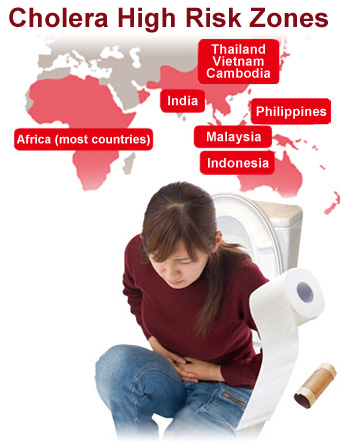| |
Cholera

Cholera is an acute diarrhoeal disease caused by the bacterium Vibrio cholerae. The short incubation period ranges from two hours to five days. Some patients may have severe symptoms with sudden onset of profuse diarrhoea with rice-water like and fishy smelling stool, nausea and vomiting. Without prompt treatment, these patients may die from severe dehydration.
The global burden of cholera is large, particularly in developing countries - Africa, Asia, South America and Middle America 1
It is an acute diarrhoeal disease caused by the bacterium Vibrio cholerae. Vibrio cholerae serogroups O1 and O139 can cause epidemic cholera 1
High-risk destinations in South East Asia, including Thailand, Indonesia, Philippines, Malaysia and India
In 2012, there are 245,393 cholera cases were notified from 48 countries, including 3,034 deaths 2

 Travelers’ Diarrhea
Travelers’ Diarrhea
It is a condition characterised by a twofold or greater increase in the frequency of unformed bowel movements. The symptoms are fever, colicky abdominal pain, or vomiting. Travelers’ Diarrhea is a clinical syndrome that can result from a variety of intestinal pathogens, including bacterial pathogens and protozoal pathogens.
Travellers' Diarrhea is acquired through ingestion of faecally contaminated food and water. Especially risky foods include raw vegetables, raw meat and raw seafood. The consequences of a disaster – such as disruption of water and sanitation systems can increase the risk of cholera transmission.
|
Preventive measures are based on good personal, food and environmental hygiene.
|
Tips for travelers
 Travelers should pay particular attention if they are travelling to cholera affected areas:
Travelers should pay particular attention if they are travelling to cholera affected areas:
- Cook food or boil water thoroughly before consumption
- No foods and beverages from unlicensed street vendors
- Avoid eating cold dishes like salads
- Peel fruit by yourself
- No ice for beverages
- If water cannot be boiled, treat water with chlorine or iodine before consumption
- It is suggested taking oral cholera vaccines before the trip for prophylaxis. It offers significant protection against cholera at 84-86% 3-5
(Note: Improvements in water supply, sanitation and personal hygiene are the best means of preventing cholera and other diarrhoeal diseases.)

For more information about oral cholera vaccine, please consult your primary doctor.
|
WHO’s view on oral cholera vaccines (Weekly epidemiological record) 6

- Oral cholera vaccines have been developed and proved to be safe, immunogenic and effective. Only 2 of these are currently being marketed internationally.
- WHO has never recommended the use of the parenteral cholera vaccine because of its limited protective efficacy (45% for 3 months) and its unsuitability for public health purposes.
- Oral cholera vaccines are considered an additional means to control cholera, but should not replace conventional control measures. Provision of safe water and sanitation is critical in reducing the impact of cholera and other waterborne diseases.
- With two safe and effective oral cholera vaccines available, immunization should be implemented with other prevention and control strategies in areas where the disease is endemic and in areas at risk for outbreak. Vaccines provide a short-term option for populations living in high-risk areas, while other measures such as improving drinking-water and sanitation take longer to be put in the place to provide sustained control of the disease.
- Oral cholera vaccine have proven to be safe and effective. However, there is a need to scale up the prevention measures in order to avert outbreaks by expanding access to improved sources of drinking-water and improved sanitation to diminish the risks of infection.
Reference
1. 世界衛生組織立場文件2010。
2. 世界衛生組織2013疫情週報。
3. Clemens JD, Sack DA, Harris JR et al. Field trial of oral cholera vaccines in Bangladesh. Lancet 1986; 2:124 -127.
4. Sanchez JL, Vasquez B, Begue RE et al. Protective efficacy of oral whole-cell/recombinant-B-subunit cholera vaccine in Peruvian military recruits. Lancet 1994; 344:1273 -1276.
5. Lucas M, Deen JL, von Seidlein L et al. Effectiveness of mass oral cholera vaccination in Beira, Mozambique. N Engl J Med 2005; 352: 757 -767.
6. Weekly epidemiological record. 2 AUGUST 2013, 88th YEAR / 2 AOÛT 2013, 88e ANNÉE, No. 31, 2013, 88, 321–336. http://www.who.int/wer
WHO, 2010
|
Copyright©2014 Hong Kong Health Care Federation All rights reserved.
|
|
